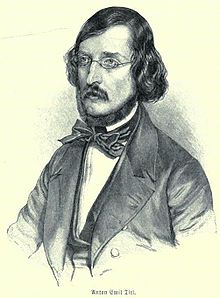Anton Emil Titl

Anton Emil Titl (2 October 1809 – 21 January 1882) was an Austrian composer and conductor. In Vienna he was Kapellmeister at the Theater in der Josefstadt and later at the Hofburgtheater.
Life[edit]
Titl was born in Nedvědice in Moravia, at that time part of the Austrian Empire; it is the location of Pernštejn Castle, where his father served as burgrave for Count Wilhelm Mitrovský. After his father's death when he was 14, the Count sent him to Frankstadt (now Nový Malín) to be trained as a teacher. At age 17 he moved to Brǜnn (Brno) to continue his training, but preferred to attend music classes of Gottfried Rieger; he also played in the orchestra of the civic theatre in the town.[1][2][3]
Early compositions[edit]
He composed an overture to Goethe's play Torquato Tasso, and a symphony, which were well received in Brǜnn and Vienna. Antonín Boček of Olmütz (Olomouc) wrote for him the libretto for an opera Die Burgfrau auf dem Schlosse Pernstein (1829), the first opera on a Moravian subject. It was performed successfully in Olmütz and Brǜnn. He wrote a mass in 1832 for the enthronement of prince-bishop Ferdinand Maria Chotek von Chotkow at Olmütz, which was performed in Prague and Vienna.[1][2][3]
For a few years he was a teacher in Olmütz, also composing songs and piano pieces, which were published; his "Gondellied" ("Gondola song") became popular.[1][2]
Prague and Vienna[edit]

In 1835 Titl was appointed conductor of a military band in Prague. In 1840 he succeeded Heinrich Proch as Kapellmeister at the Theater in der Josefstadt in Vienna, which was under the management of Franz Pokorny.[2][4] He composed music for the plays performed there, including many plays by Franz Xaver Told, of which Der Zauberschleier was very successful.[1][5] His biographer in Allgemeine Deutsche Biographie (1894) wrote: "Often enough, he was obliged to save the life of weak farces with 'appealing' music...."[1]
From 1850 he was Kapellmeister at the Hofburgtheater in Vienna, and composer of music for plays performed there, writing incidental music and about 50 overtures. He retired from the Hofburgtheater in 1870. Soon afterwards he wrote music for Franz Grillparzer's trilogy of plays Das goldene Vlies. Titl died in Vienna in 1882.[1][2]
References[edit]
- ^ a b c d e f Rudolf Müller (1894), "Titl, Anton Emil", Allgemeine Deutsche Biographie (in German), vol. 38, Leipzig: Duncker & Humblot, pp. 381–382
- ^ a b c d e Wurzbach, Constantin von, ed. (1882). . Biographisches Lexikon des Kaiserthums Oesterreich [Biographical Encyclopedia of the Austrian Empire] (in German). Vol. 45. p. 194 – via Wikisource.
- ^ a b "Titl, Anton Emil (1809–1882), Dirigent und Komponist" Österreichisches Biographisches Lexikon. Retrieved 6 May 2021.
- ^ "Titl, Anton Emil (eig. Anton Franz Seraphim)" Oesterreiches Musiklexikon Online. Retrieved 6 May 2021.
- ^ Wurzbach, Constantin von, ed. (1882). . Biographisches Lexikon des Kaiserthums Oesterreich [Biographical Encyclopedia of the Austrian Empire] (in German). Vol. 46. p. 5 – via Wikisource.
External links[edit]
- Free scores by Anton Emil Titl at the International Music Score Library Project (IMSLP)
 Media related to Anton Emil Titl at Wikimedia Commons
Media related to Anton Emil Titl at Wikimedia Commons
